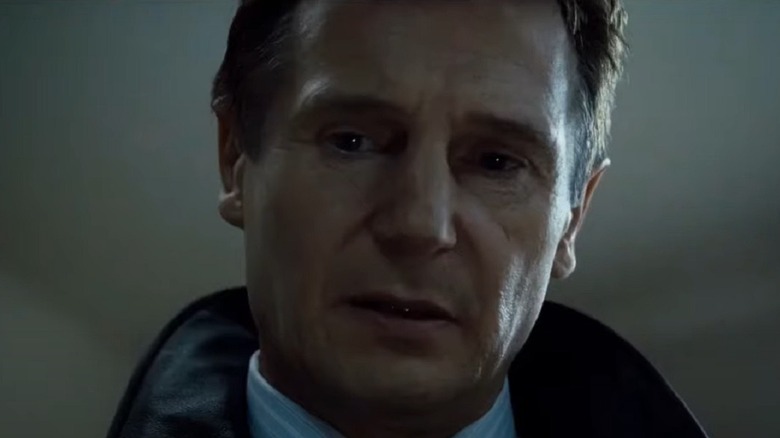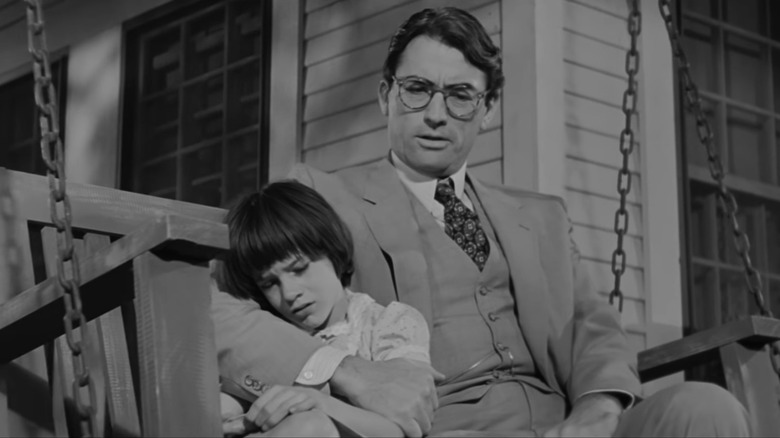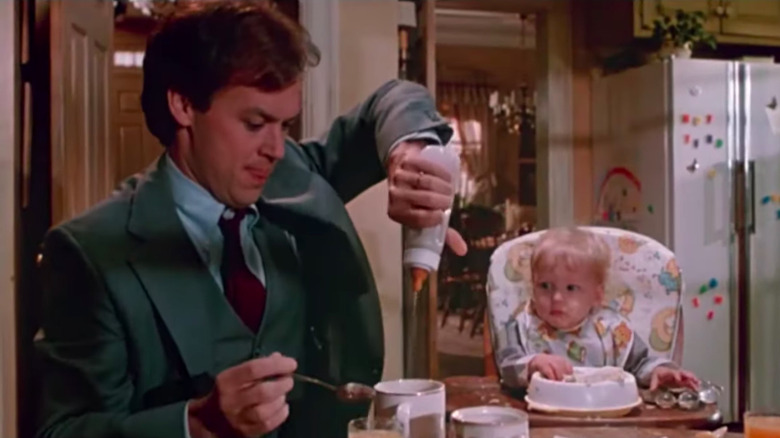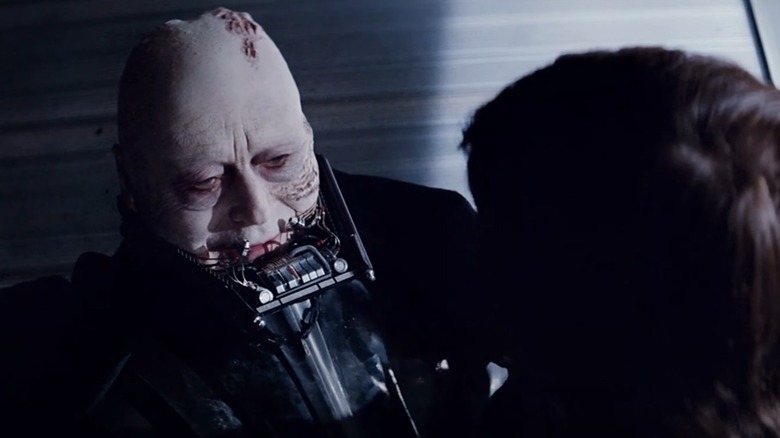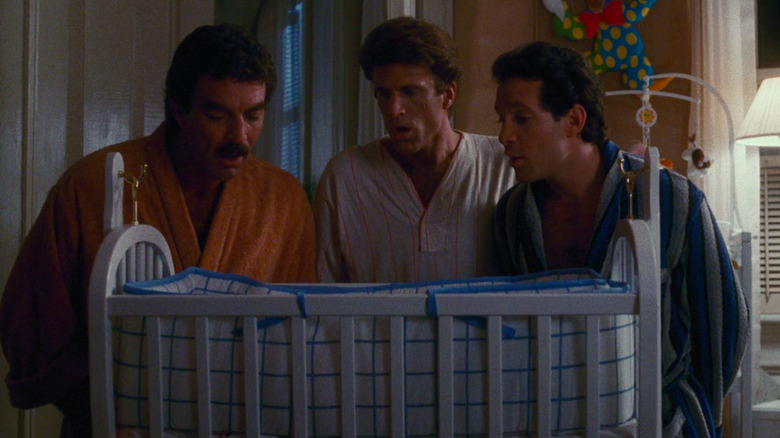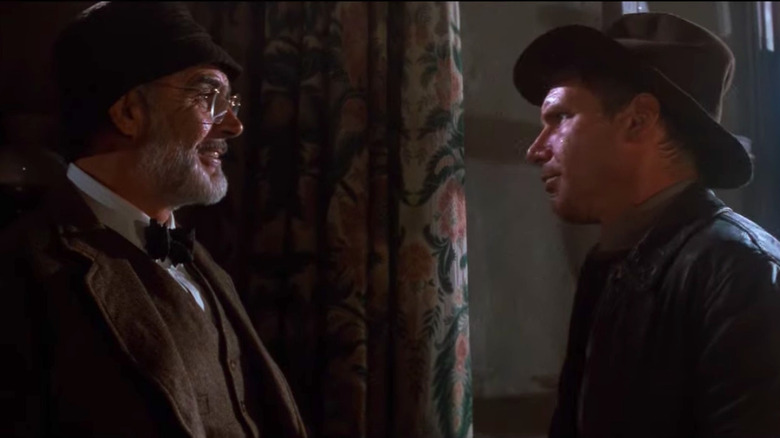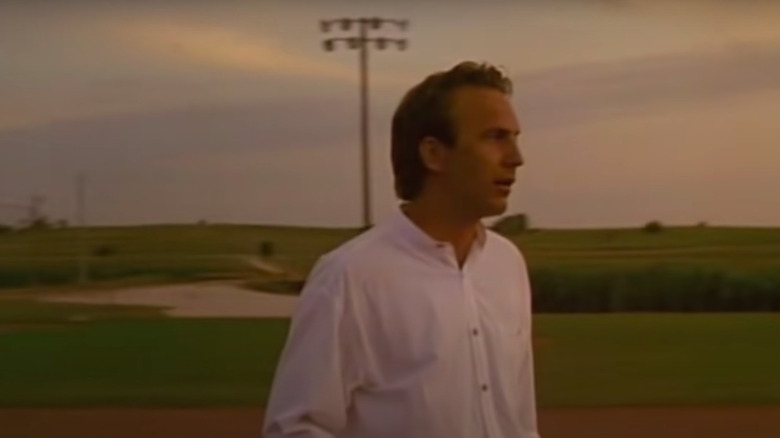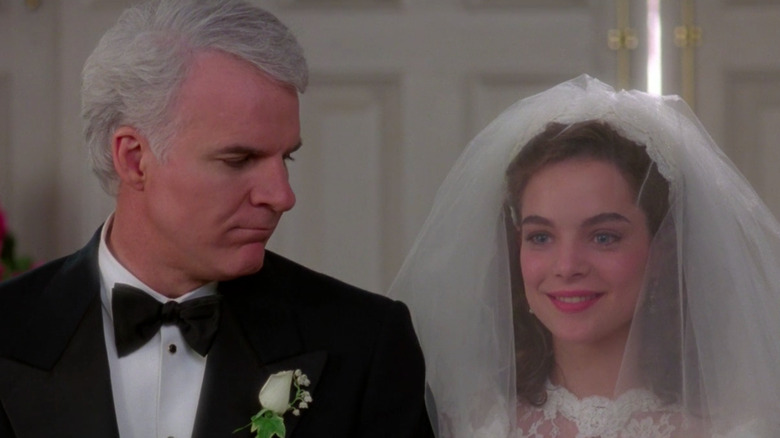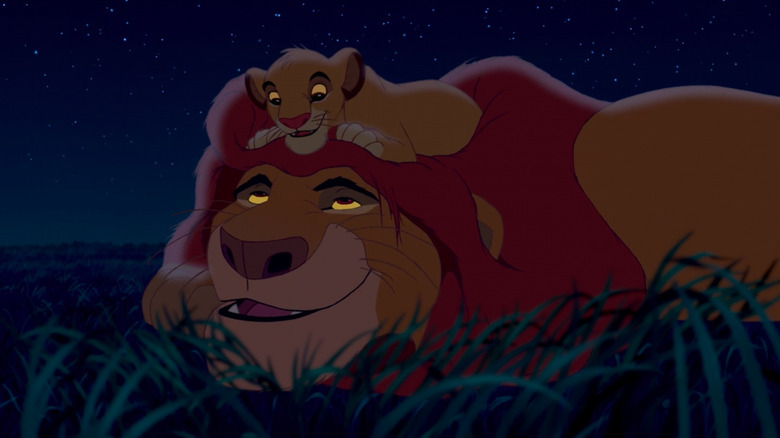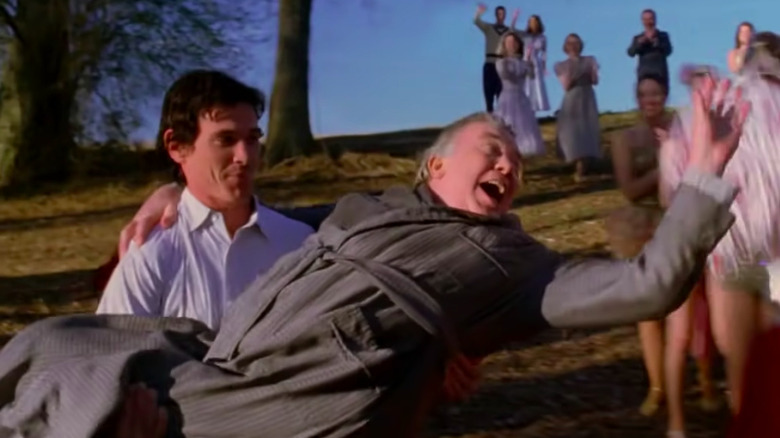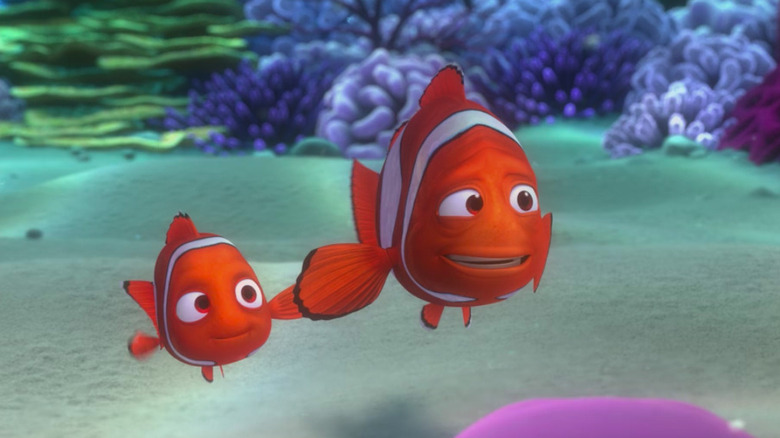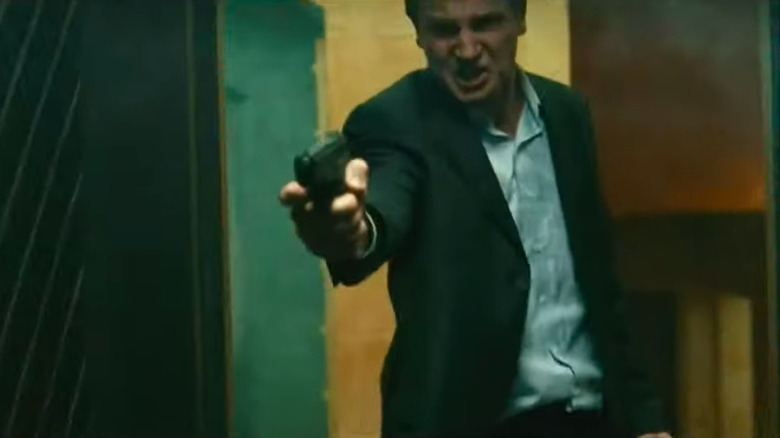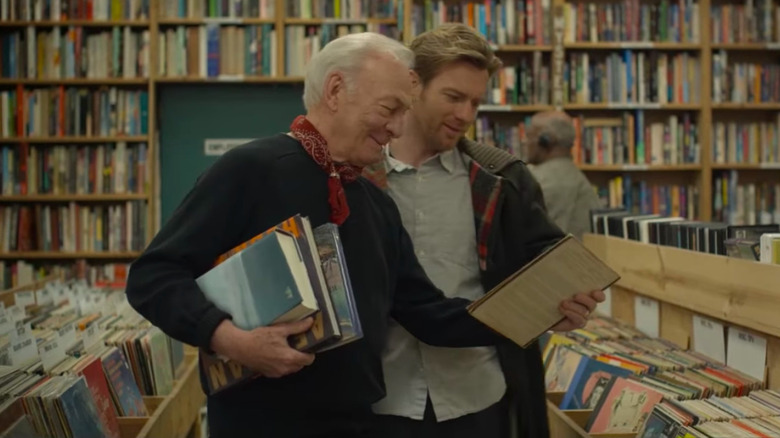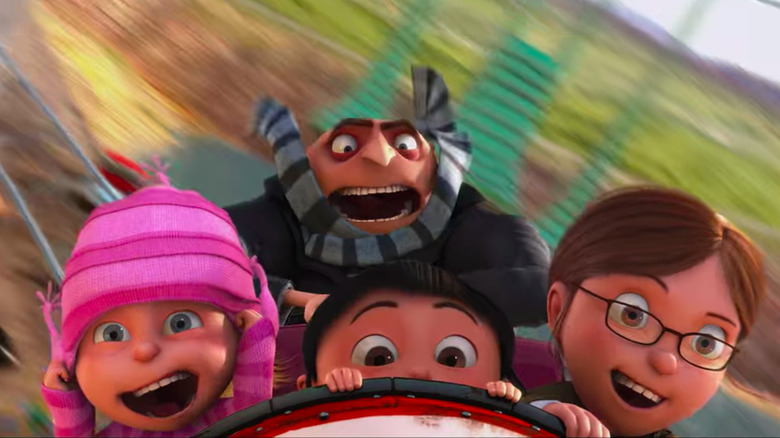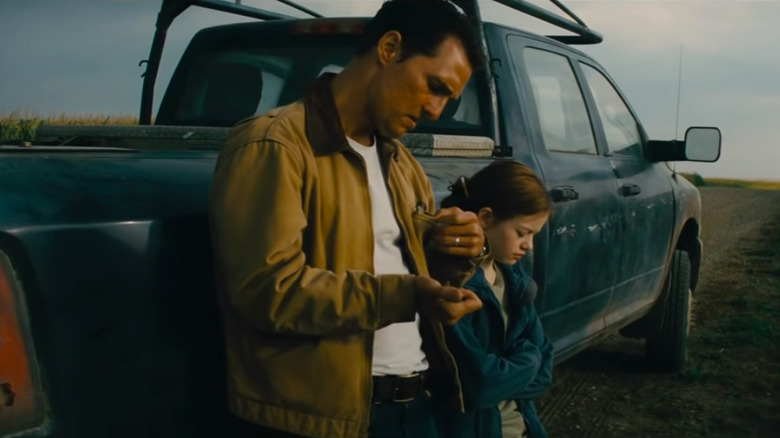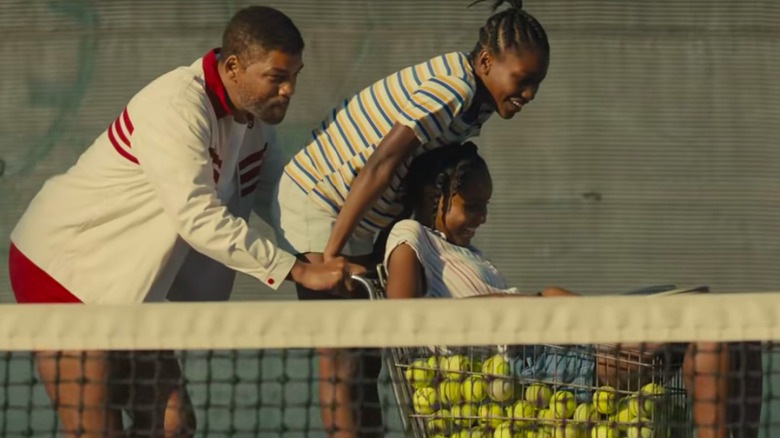The Best Dad Movies You Should Watch At Least Once In Your Lifetime
If the movies are anything to go by, there are many different ways to be a good dad. Practically since the advent of the medium, films have explored the challenges of being a father and the many different ways men have responded to it, from strict to easy-going, and from free-spirited to over-protective. And perhaps even more films focus on childrens' struggles to understand who their fathers are, and how that seminal relationship impacted their lives. After all, fathers have been given many roles by society, including financial provider, wise sage, and best pal, yet no matter how much a parent wants to, no one can be everything to their kids all at once.
Movies have often dramatized this issue, and that has led to a range of films from all different genres. Comedies often mine the vagaries of fatherhood for laughs, while some action films show just how far a dad is willing to go to help their child. Dramas, meanwhile, like to depict dads trying to do right by their kids, and then there are fantasy films that grapple with a father's legacy. Though there are many more, here are 15 fantastic films about dads and their children that are worth checking out at least once in your life.
To Kill a Mockingbird (1962)
Based on Harper Lee's Pulitzer Prize-winning novel of the same name, "To Kill a Mockingbird" is an earnest drama told through the eyes of young Scout Finch (Mary Badham). Scout lives with her widowed father, Atticus Finch (Gregory Peck), and her older brother, Jem Finch (Phillip Alford), in a small Georgia town in 1932. The kids are still innocent and unburdened by the concerns of adults when we meet them. When their father — a principled lawyer who fights for what's right — takes a case defending a Black man against a white woman's accusation of rape, however, the kids witness the town's simmering racism for themselves.
Peck is riveting as Atticus — a role he scored a best actor Oscar for — and the courtroom scenes are among the film's most nail-biting. Yet, Atticus also comes across as the epitome of the wise, patient father, calmly listening to Scout and Jem's worries and easing their concerns. That is, until they're hurt, and the protective father in him comes out. It's a lovely, understated depiction of fatherhood that's rarely seen in movies anymore.
Mr. Mom (1983)
"Mr. Mom" centers around Jack (Michael Keaton), a man who loses his job and ends up staying home to take care of his three kids while his wife, Caroline (Teri Garr), finds a job and goes to work. Needless to say, with a title like "Mr. Mom," the movie has some rather antiquated ideas about gender roles, but the concept of an unprepared dad taking care of his kids never gets old. It's not so much that Jack is a man, it's that he seems to lack common sense. After all, even an adult with no experience with kids could tell you it's probably a bad idea to leave your baby alone in the supermarket or let your young child cook with minimal supervision.
Even though the movie isn't especially deep, Keaton and Garr are both great, elevating the material beyond its lightweight premise. Keaton got his start in comedies, and "Mr. Mom" is a prime example of his comic sensibilities, which makes it a fun watch for anyone who only knows him from "Batman" and his other serious work. Plus, the movie shines a light on just how hard being a homemaker is, no matter your gender — a point that's still valuable today.
Star Wars: Episode VI – Return of the Jedi (1983)
Many "Star Wars" fans consider "The Empire Strikes Back" to be the finest film in the franchise, at least partially because of the climactic battle between Luke Skywalker (Mark Hamill) and Darth Vader (David Prowse with the voice of James Earl Jones) that leads to the revelation that Vader is Luke's father. But it's "Return of the Jedi" in which Luke deals with the consequences of this knowledge. As a result, in addition to the Death Stars, Ewoks, and Droids that fill the movie, it also includes another showdown between Luke and his father, although this time, their familial ties take center stage.
While in the past, Luke would have fired up his lightsaber first and asked questions later if he'd come across Darth Vader, in "Return of the Jedi," he seeks him out in the hopes he can convince him to give up the Dark Side. Vader may not be willing to go that far, but when the Emperor tortures Luke, Vader ultimately steps up and saves his son, sacrificing himself in the process. Any fan can tell you there are many reasons to love "Star Wars," but it's the fall of Anakin Skywalker and his redemption through Luke that makes the story truly operatic.
Three Men and a Baby (1987)
Due to when it came out, "Three Men and a Baby" is a bit on the dated side, especially in the first third. But, despite the questionable '80s fashion, it grows to be a universally relatable story of fighting for what you love. The movie centers on Peter (Tom Selleck), Michael (Steve Guttenberg), and Jack (Ted Danson), three swinging bachelors who share an apartment in New York City. Their lives are upended when someone drops a baby off at their door and they are obliged to take care of her, a situation that initially horrifies them but that they soon come to embrace as they learn to love the child.
The movie also includes a subplot about foiling drug dealers that ends well before the climax of the film, but "Three Men and Baby" (which was directed by Leonard Nimoy — yes, Spock from "Star Trek") is really the story of a seemingly irresponsible trio discovering joys they never expected in fatherhood. It's jam-packed with warmth and humor, which is why it was the highest-grossing film of 1987. And even though there's a cringeworthy moment where one of the men attempts to enlist his girlfriend to help him because he assumes women naturally know more about parenting, the movie thankfully smacks down that assumption. In the end, all three men prove to be exceptional caretakers who find their purpose in fatherhood.
Indiana Jones and the Last Crusade (1989)
Before "Indiana Jones and the Last Crusade," audiences had gotten to know and love Harrison Ford's iconic archeologist over two previous adventures, "Raiders of the Lost Ark" and "Indiana Jones and the Temple of Doom." In neither of those films did the subject of Indy's parents come up. The character seemed fully formed just as he was, with no need to go back to his roots. Yet, when Indy's father, Henry Jones Sr. (Sean Connery), was introduced in "The Last Crusade," it turned out to be what made the movie stand out from its predecessors and a way to show us a very different side of the familiar character.
While Indy previously seemed to triumph in every situation through smarts and skill, he's no match for his father, who he deeply resents for being more interested in finding the Holy Grail than paying attention to him during his childhood. But, despite the obvious tension, there's also a deep love and commitment there. When Indy learns that his father has been kidnapped, he immediately springs into action to find him, and when Henry thinks Indy has died, his mournful reaction sums up the feelings he'd never admit he has for his son. Due to their fractious chemistry, it's remarkably entertaining to watch these two go on an adventure together. While they may not completely hash out their differences, they at least find some common ground in their connection as father and son.
Field of Dreams (1989)
Based on the novel "Shoeless Joe" by W.P. Kinsella, "Field of Dreams" is a fantasy film about a farmer who builds a baseball field on his land after a disembodied voice tells him to. The ghosts of baseball players past, including Shoeless Joe Jackson (Ray Liotta), then come to play there. However, the film is actually much more than that. It's a tale of a son working through his regret over his broken relationship with his father, John (Dwier Brown), long after John has passed away.
The story focuses on Kevin Costner's Ray Kinsella, whose father loved baseball and attempted to get Ray to embrace the game as well. However, Ray rebelled as a teen, and after lashing out at his father over his admiration for Shoeless Joe, the two never spoke again. As a result, John never met Ray's wife or daughter or knew anything about his son's life as an adult. The movie doesn't overemphasize Ray's pain over this, but scenes involving his dad bookend the film. John also comes up at several key points during the story, making it clear that, at its core, this is a film about healing a father-son relationship, a theme that makes "Field of Dreams" particularly poignant and meaningful.
Father of the Bride (1991)
"Father of the Bride" is a remake of the 1950 film of the same name, and the premise largely remains the same. After a young woman (Kimberly Williams) announces that she's getting married, her father must confront the pain of losing her while also dealing with the stress of organizing — and paying for — the wedding. However, this version of the story has something the earlier film didn't: Steve Martin as the title character, George.
Martin was known for being a reliable comedic lead long before "Father of the Bride," but in this film, he reins in some of his more outlandish and tart impulses to turn in a slightly melancholy yet still amusing performance. Besides, his character's difficulty letting go of his daughter doesn't completely prevent Martin from engaging in some zany antics, including a scene at a grocery store where he takes an angry, ridiculous stand over the packaging of hot dog buns. It's a funny, moving portrait of a parent's struggle to accept his daughter is no longer a child. Plus, for fans of the Hulu series "Only Murders in the Building," it's another example of a collaboration between Steve Martin and Martin Short, who turns up as a barely understandable French wedding planner.
The Lion King (1994)
"The Lion King" is one of the most beloved Disney animated films of all time, and for good reason — even though it centers on a group of animals, it tells a highly human story of children and their parents. At the heart of the movie is the relationship between the lion Mufasa (James Earl Jones), the king of the Pride Lands, and his son Simba (Matthew Broderick). Simba wants to be just like Mufasa when he grows up, even though as a young cub he doesn't entirely grasp what it means to be a king or lead a kingdom. But when Mufasa tragically dies and Simba's nefarious uncle Scar (Jeremy Irons) claims Simba is responsible, the little lion's life takes an unexpected turn.
Featuring stunning animation as well as plenty of animal antics and silly fun, "The Lion King" can also be surprisingly heavy — the scene of Mufasa's death is especially difficult to watch. Yet, it's ultimately a rewarding story about finding the courage to live up to a parent's legacy.
Big Fish (2003)
One of the most difficult things for some adult children to do is to genuinely get to know their parents, not as authority figures but as people. In "Big Fish," Will Bloom (Billy Crudup) has just this problem, with an added layer of complexity: Throughout his life, his father, Edward (Albert Finney), has told him the same fantastical tales over and over, but while Ed insists all Will needs to know about him is embedded in his stories, Will believes they're nothing but lies. This has kept the two men at odds for most of Will's adult life. So when he learns his father is dying, Will returns to his childhood home determined to finally learn the true story of Ed's life.
While the backbone of the movie is the conversations between Will and Ed, the film is filled out by dramatizations of Ed's curious tales, which feature a younger version of himself (Ewan McGregor) as the protagonist. This makes "Big Fish" come across as something of a fairy tale, with director Tim Burton providing plenty of fantastical flourishes and enchanting visuals to maintain the mood. Ultimately, though, "Big Fish" is a moving story about coming to terms with your parents, whether they're who you want them to be or not.
Finding Nemo (2003)
Pixar is known for tackling complicated issues with its family-friendly computer-animated films, and in "Finding Nemo," it explored the challenges of parenthood through the eyes of Marlin (Albert Brooks), a clownfish who — in one of the most upsetting scenes you will see in a kids film — loses his partner and soon-to-be-hatched children in an attack, with the exception of his son, Nemo (Alexander Gould). Marlin was already a nervous fish before the majority of his family perished, and afterward, he becomes an over-protective father to the one child he has left. Needless to say, Nemo can't help but rebel against his father's well-meaning but stifling parenting, leading him to be taken by scuba divers.
Marlin goes against everything in his nature to track down his lost child, venturing far away from the safety of the home he knows. Along the way, he learns he needs to let go of Nemo in order for him to grow up to be an independent fish. It's a poignant and charming tale that's sure to move anyone who's tried to find the right balance between protecting those they love and giving them the space to forge their own paths.
Taken (2008)
The action flick "Taken" perfectly encapsulates what many parents want to do when someone hurts their child. Of course, in this case, Liam Neeson's Bryan Mills is a retired CIA agent with a "particular set of skills," so after his teenage daughter Kim (Maggie Grace) is abducted in Paris, Mills uses every one of them to get her back. "Taken" kicked off the action movie phase of Neeson's career, but this may be the best among his stunt-heavy projects.
The movie is full of rip-roaring fights and gritty stunt sequences, but it's Mills' unrelenting determination to find Kim that gives the film its emotional resonance. Although Mills drops a lot of bodies throughout "Taken," they're all terrible men doing horrible things to young girls. In a world where so many of us are powerless to stop bad things from happening to the people we love, there's a strangely cathartic thrill to seeing one father refuse to let his daughter become a statistic.
Beginners (2010)
Christopher Plummer rightfully won an Oscar for best supporting actor for his tender performance as Hal in "Beginners." Following the death of his wife, Hal reveals he's gay to his son Oliver (Ewan McGregor) and starts living as an openly gay man. He finds a boyfriend and gets involved in LGBTQ causes, only to be diagnosed with stage 4 cancer soon afterward.
The movie moves back and forth between the story of Oliver's experiences with Hal during this time and of what happens when he meets and starts a relationship with a French actress named Anna (Mélanie Laurent) mere months after Hal's death. McGregor plays Oliver as a man at an inflection point who is inspired and surprised by the way coming out frees his dad to become more truly himself, and he and Plummer have a touching chemistry as a son and father who are finally learning to be close in the twilight of the father's life. "Beginners" is unabashedly sentimental and has its own unique rhythm, giving it a fable-like quality, but it's also delicately witty and compassionate toward its flawed, sympathetic characters.
Despicable Me (2010)
The animated "Despicable Me" takes place in a world where supervillains run rampant. An unconventional setting for a story about fatherhood if ever there was one, but by the time it ends, it evolves into a touching tale of finding family in the most unexpected places. After supervillain Gru (Steve Carell) has been shown up by Vector (Jason Segal), the new villain on the block, he decides to regain his former glory by stealing the moon. However, he has to steal his rival's shrink ray to do it, so when he notices three orphan girls being allowed into Vector's seemingly impenetrable fortress, he adopts them with the intention of using them to accomplish his goals and then returning them to the orphanage when he's done.
Gru isn't exactly prepared to be a dad, but even though he never expected it, he starts bonding with the trio of girls. And by the time he steals the moon, he cares more about ensuring their safety than he does about his villainous accomplishments. The movie's depiction of the way the three girls break down Gru's walls by just being themselves is sweet and often amusing, and with the wacky yellow minions around, it's also often laugh-out-loud funny, making "Despicable Me" a film that's likely to entertain almost anyone.
Interstellar (2014)
"Interstellar" is a big, bold film stuffed full of scientific jargon, including references to time dilation, black holes, and gravitational forces. And once Joseph Cooper (Matthew McConaughey), its main character, takes off on a mission to space to save humanity, it becomes an epic vision of faraway planets and desperate maneuvers. Yet, while the movie is a sprawling, grand-scale science fiction adventure, on a more human level, it's the story of a father and his daughter.
Cooper is a former NASA pilot who accepts the mission to go to space when his daughter Murphy (Mackenzie Foy) is only 10 years old. Yet, while he promises that he'll see her again, as his mission goes on and time passes at different rates on Earth and the various planets Cooper travels to, Cooper and Murphy start aging at different rates and Cooper becomes increasingly worried he won't be able to do what he said. It's this plotline that gives "Interstellar" its soul and makes it such a heartbreaking, engrossing experience, whether you understand its scientific mumbo jumbo or not.
King Richard (2021)
Will Smith gives a towering performance as Richard Williams in this inspiring biopic about the early years of tennis superstars Venus and Serena Williams. Other sports biopics might have made Venus and Serena the main characters, but in "King Richard," they're secondary to the Williams patriarch, who is depicted as exacting, overbearing, and demanding but also warm, supportive, and caring to the point where it's easy to understand why his daughters love him — even if others may not appreciate his posturing.
While the movie makes it clear that Richard has his flaws, it also does a good job explaining that Richard does what he feels he has to in order to ensure the success of his kids. Like many parents, he wants his children to have a better life than he did, and through tenacity and ingenuity, he figures out a way to make that happen, even though the odds initially seem insurmountable. Even if you know what happens in the tennis matches recounted in the film, "King Richard" still manages to draw viewers in by always coming back to the proud father waiting just off the court.
